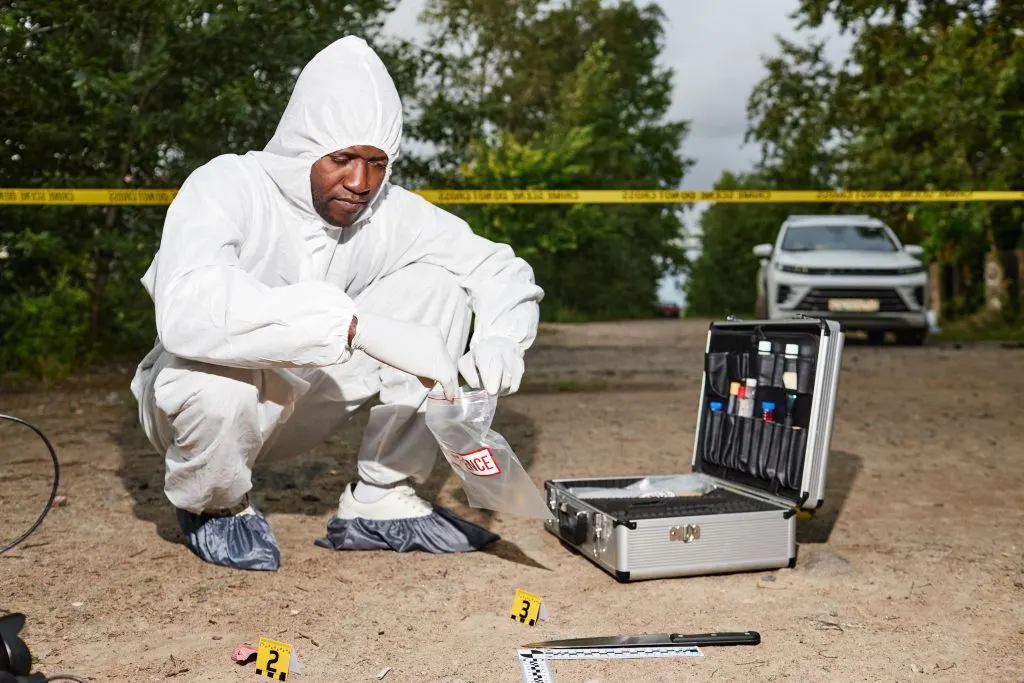The internet has shaped the modern world, and the rise of artificial intelligence has brought cybercriminal activity, forensic breakthroughs, and a new era of public safety priorities. As a result, the demand for skilled criminal justice professionals is reaching new heights. Several high-growth criminal justice jobs are projected to expand significantly through 2025 and beyond. These fast-growing criminal justice careers offer stability and purpose-driven work but also create opportunities for career advancement in diverse settings, from federal agencies and police departments to the private sector. At Keiser University, our criminal justice degree programs are designed to prepare students for this next generation of justice-focused careers, equipping them with the skills, knowledge, and flexibility to thrive in a dynamic legal system.
Table of Contents
-
- Why Criminal Justice Careers Are Booming in 2025
- The Fastest-Growing Criminal Justice Careers to Watch And What They Do
- What Does an Information Security Analyst Do with a Criminal Justice Degree?
- Is a Forensic Science Technician a Good Job in Criminal Justice?
- Should I Be A Financial Examiner in The Criminal Justice Field?
- Is Becoming a Probation Officer a Good Criminal Justice Career Path?
- What Do Police Detectives and Crime Analysts Do in a Data-Driven Justice System?
- New Trends Reshaping Criminal Justice Careers
- Choosing the Right Criminal Justice Degree for Your Career Path
Why Criminal Justice Careers Are Booming in 2025
Criminal justice jobs in cybersecurity, forensic science, and community corrections are expected to experience notable growth in 2025 and beyond. In Florida, the state continues to offer incentives and recruitment programs to attract qualified candidates to law enforcement, including financial bonuses and fast-track certifications.
Perhaps most importantly, the criminal justice field has proven to be recession-resilient. Whether during economic downturns or public health crises, the need for qualified professionals remains constant. This makes criminal justice a mission-driven path and a strategic and secure career choice for the long term.
The Fastest-Growing Criminal Justice Careers to Watch and What They Do
Here are five fast-growing roles you can pursue with a criminal justice degree.
What Does an Information Security Analyst Do with a Criminal Justice Degree?
As cybercrime advances, information security analysts are at the front lines of protecting data, systems, and national infrastructure. The job represents a projected growth opportunity, outpacing the average career at 33%, for those with a criminal justice background, especially as public and private organizations work to mitigate increasingly complex cyber threats.
Responsibilities include:
- Investigating and preventing cybercriminal activity
- Monitoring networks for security breaches and system vulnerabilities
- Analyzing malware, phishing, and hacking attempts
- Supporting law enforcement with digital forensics and cybercrime investigations
Work environments:
- Federal agencies and homeland security departments
- Public safety organizations and law enforcement units
- Corporate IT departments and financial institutions
Education path:
- A background in criminal justice, combined with specialized training in cybersecurity or digital forensics, is ideal
- Keiser University offers criminal justice degree programs that align legal, investigative, and technical skills to prepare graduates for this emerging field.
Why it matters: Cyberattacks target everything from healthcare records to government infrastructure, and information security analysts help uphold safety in the digital space. A criminal justice lens brings critical thinking and legal awareness to cybersecurity defense strategies.
Is a Forensic Science Technician a Good Job in Criminal Justice?
With a projected growth of 14% according to the Hispanic Engineer & Information Technology, forensic science technicians serve as the bridge between investigative work and scientific evidence. They follow best practices from organizations like the International Association for Identification, using advanced forensic technology to help law enforcement transform crime scene evidence into legally admissible findings.
Responsibilities include:
- Collecting and preserving physical evidence at crime scenes
- Analyzing DNA, fingerprints, fibers, and biological materials in lab environments
- Operating forensic photography and digital forensics software
- Preparing reports and offering expert testimony during trials
Work environments:
- Local and state crime labs
- Medical examiner and coroner offices
- Law enforcement agencies
Education path:
- A bachelor’s degree in forensic science, biology, or chemistry is typically required for this role. However, students with a criminal justice background may pursue related fields in crime analysis, evidence handling, or investigative support.
- Keiser University’s programs provide hands-on instruction in evidence handling, lab procedures, and investigative protocol.
Why it matters: Forensic technicians apply scientific rigor to evidence, strengthening investigations and supporting the integrity of the criminal justice system. Their work influences verdicts, strengthens investigations, and ensures integrity in the legal system.

Should I Be A Financial Examiner in The Criminal Justice Field?
Financial examiners investigate fraud, enforce regulatory compliance, and protect the integrity of financial systems, especially in areas like anti-money laundering (AML) and white-collar crime. With financial crime on the rise according to a 2025 Kroll study, the field is gaining traction as one of the fastest growing criminal justice careers.
Responsibilities include:
- Monitoring financial institutions for fraud, misreporting, and compliance violations
- Conducting audits and applying evidence-based practices to detect financial crime
- Collaborating with agencies like the Financial Crimes Enforcement Network (FinCEN) to support investigations
- Preparing reports and presenting findings to enforcement bodies
Work environments:
- Federal and state regulatory agencies
- Internal compliance teams within corporations and banks
- Law enforcement and criminal investigative units
Education path:
- A bachelor’s degree in criminal justice, accounting, or finance is recommended
- Keiser University’s curriculum includes coursework in investigations, compliance, and analytical methods that align with fraud examination roles.
Why it matters: The number of financial examiners is projected to grow by 21% over the next 10 years. Their work ensures accountability and transparency across financial systems and aids in identifying criminal conduct that might otherwise remain hidden.
Is Becoming a Probation Officer a Good Criminal Justice Career Path?
Probation officers and correctional treatment specialists help individuals reintegrate into society while holding them accountable to court-ordered conditions. With approximately 7,400 openings and 3% growth projected each year, this field offers steady opportunities for those committed to rehabilitation (O Net Online).
Responsibilities include:
- Supervising individuals on probation instead of incarceration
- Referring clients to mental health, job training, or rehabilitation programs
- Coordinating with correctional institutions and parole boards
- Maintaining case reports and testifying in court as needed
Work environments:
- Probation and parole offices
- Correctional institutions
- County and municipal court systems
Education path:
- An associate’s degree in criminal justice may be sufficient for some roles
- A bachelor’s degree is often preferred for advancement
- Keiser University’s criminal justice programs offer both entry-level preparation and pathways for career growth
Why it matters: Probation officers are critical in reducing recidivism by balancing supervision with supportive interventions. According to the American Probation and Parole Association, their impact extends beyond law enforcement and helps restore lives while promoting long-term community well-being.
What Do Police Detectives and Crime Analysts Do in a Data-Driven Justice System?
Police detectives and crime analysts remain foundational to law enforcement, but the way they work is evolving. With about 4% projected annual growth in this field (BLS via College Vine), professionals are increasingly expected to pair investigative instincts with data analytics and tech-enabled strategies.
Responsibilities include:
- Investigating serious crimes such as homicide, robbery, and fraud
- Analyzing crime pattern data to identify trends and allocate patrol resources
- Using digital tools like GIS mapping and predictive analytics to support crime prevention
- Collaborating with FBI agents, forensic experts, and local law enforcement units
Work environments:
- City, county, and state police departments
- Federal law enforcement agencies
- Criminal intelligence and strategic planning divisions
Education path:
- Entry-level detective work may start with a police academy and law enforcement experience
- Analysts typically need a bachelor’s degree in criminal justice or a related field with coursework in research methods and statistics.
- Keiser University’s programs support both tactical and analytical career tracks in the field.
Why it matters: As law enforcement shifts toward intelligence-led policing, the demand for crime analysts and detectives who can apply data-driven approaches continues to grow. According to the International Association of Chiefs of Police, these roles are key to building safer communities and more transparent police practices.
What Are the New Trends Reshaping Criminal Justice Careers?
Emerging technologies and evolving threats are rapidly reshaping the future of criminal justice. Digital evidence collection, artificial intelligence, and data-informed policing models are influencing how professionals investigate crimes, analyze threats, and support public safety.
| Trend | Impact |
| Forensic technology
|
Advances in DNA analysis, digital forensics, and biometric scanning are improving case accuracy and efficiency.
|
| AI in policing
|
Tools like predictive analytics and machine learning help forecast crime patterns and allocate law enforcement resources more effectively.
|
| Body camera data analysis
|
New software allows departments to assess incidents faster and ensure transparency in policing.
|
| Cybersecurity crossover
|
As public safety increasingly extends into the digital realm, cybersecurity jobs with a criminal justice degree are on the rise.
|
| Community-based approaches
|
Emphasis on de-escalation, rehabilitation, and localized response continues to shape law enforcement strategies.
|
| Crime Analysts
|
Crime analysts play a critical role in modern policing by interpreting data to identify trends, predict future crimes, and support tactical decisions. Their work influences patrol deployment, crime prevention strategies, and resource allocation.
|
According to the National Institute of Justice and Department of Homeland Security, these trends are not just transforming tools and tactics; they’re also creating new job titles and specialized roles across federal, state, and local agencies. Criminal justice students who gain early exposure to tech-forward skills and interdisciplinary training will be better prepared to adapt and lead in these evolving environments.

Choosing the Right Criminal Justice Degree for Your Career Path
Every career path in the justice system requires a different academic foundation. Whether seeking a fast-track entry point or aiming for a leadership role in the field, aligning your degree choice with your goals is key.
| Associate Degree | Bachelor’s Degree |
|
|
| Master’s Degree | Doctoral Degree |
|
|
From foundational knowledge to advanced expertise, Keiser University’s degree offerings support every stage of your professional development. Choosing the right academic pathway ensures you’re equipped to make a meaningful impact in the field of criminal justice.
From Classroom to Career: Criminal Justice Graduates in Action
The success of criminal justice graduates is often measured by how well they apply their education in real-world roles. From probation supervision to digital investigations, alumni from our programs have gone on to support public safety and justice in meaningful ways across the country.
 |
“Keiser University provided me with everything I needed for my future career as a licensed Florida Bar Attorney. While at Keiser University, I retained an Associate’s Degree in the Paralegal Studies Program. The program helped me develop not only the essential skills a paralegal is required to hold but also long-term practical and professional skills.”
— Arisnelvys Gonzalez – Keiser University Graduate |
Stories like Arisnelvys’ speak to the versatility and strength of our programs, and how we empower students to pursue a wide range of justice-centered roles. Whether you’re aiming for law school, a government position, or corporate security, Keiser University equips you with the education and experience to thrive.
Keiser University is a private, independent, nonprofit university with multiple campuses in Florida, an online campus, and international sites. Co-founded in 1977 by Chancellor Arthur Keiser, Ph.D., and Evelyn Keiser, Keiser University currently offers more than 100 degrees, ranging from associate to doctoral levels. Keiser University is a designated Hispanic-Serving Institution, a member of the Hispanic Association of Colleges and Universities, and was ranked No. 1 in the U.S. in providing Social Mobility by U.S. News and World Report in 2023.
Explore all of Keiser University’s online criminal justice programs. We offer the flexibility needed for working professionals and career changers to excel.
 |
About the Author: Dr. Fred Turner | |
| Dr. Fred Turner is the Graduate Chair of the Criminal Justice and Homeland Security programs at Keiser University’s Graduate School in Fort Lauderdale, FL. He holds a Ph.D. in Criminal Justice with a focus on Behavioral Science and a Doctor of Public Administration. With over 20 years of combined experience in academia, the military, and federal service, his research focuses on border security, transnational crime, and police militarization.
|
||
| Google Scholar Profile | ||






 The instructors at Keiser University impacted my life. They believed in my ability to become a great graphic designer, regardless of how I felt about my skills. KU helped to prepare me for the real world and got me to where I am today.
The instructors at Keiser University impacted my life. They believed in my ability to become a great graphic designer, regardless of how I felt about my skills. KU helped to prepare me for the real world and got me to where I am today.
